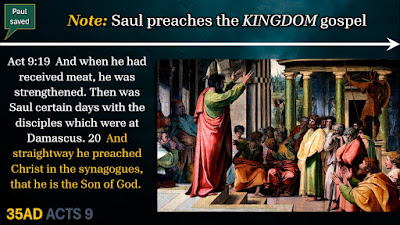Did Paul ever teach the Kingdom Gospel?
Yes! But only for a very short period of time.
Paul, blinded by the glory of Jesus Christ on the Damascus Road, was led into Damascus by his companions after his encounter. He spent 3 days without sight and sustenance. Then Ananias prayer for Saul’s sight and Saul was strengthened with food. Straightway after he gained his strength, Saul went to the Jewish synagogue and started to preach that Jesus is the Son of God. See Acts 9:19 in the image.
This is the only time when Paul preached the Kingdom gospel.
How do we know it was the Kingdom gospel? In verse 19 it says that Saul preached that Jesus is the Son of God. This was the key faith condition (and confession) for receiving salvation as per this gospel. A person had to believe that Jesus was the prophesied Messiah and confess Jesus as the Messiah, the Son of God.
For confirmation of this, have a look at these examples of people being saved under the Kingdom gospel.






